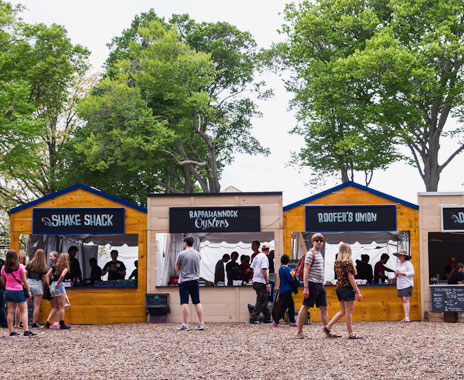The first Sweetlife festival consisted of two amps and a turntable behind the second location of Sweetgreen, the local ingredient–focused, socially conscious salad fast casual that created the annual event. This year’s festival, the sixth, will be held May 30–31 at Columbia, Maryland’s Merriweather Post Pavilion and will feature the likes of Kendrick Lamar and Charli XCX, with thousands of people in attendance.
But the scale of the festival isn’t the only thing that will be different this year over years past. For the first time, Washington, D.C.–based Sweetgreen is taking over the festival’s concessions. That doesn’t mean it’s all arugula; instead, the brand that prizes sustainability, responsibility, and fresh ingredients is hosting chefs and businesses that share its values—like Shake Shack and Luke’s Lobster—to serve food that “makes sense for concessions but with quality and locality that fit our ethos,” says Michael Stebner, Sweetgreen’s culinary director.
Stebner joined the team after last year’s festival and kept hearing that, while the food around the festival perimeter was great, the options in the thick of the action were still nachos and hot dogs—cafeteria-grade food, he says, and at inflated prices typically associated with other events. Sweetgreen wanted to offer “something that’s very unique and very high quality—at normal concession prices, but at least at a quality that matches the price point,” he says.
“It just makes so much sense,” Stebner says. “We have this premium festival with all these incredible artists that are very progressive. The whole idea of the festival is elevated. It doesn’t make sense to have crummy food.”
Sweetgreen is insuring against that in numerous ways. This year, in addition to concessioners like Luke’s and EatPops, which offers natural ice pops in flavors like super detox (acai, noni, goji, and cherry), there will be a chef’s corner with high-profile names like Jose Andres and Dan Barber. Barber’s Blue Hill Farm is doing a “wastED” vegan burger formed from leftover juicing pulp and sandwiched in day-old bread that’s been worked back into dough and then reshaped as buns. There’s also a tavern lineup, featuring a Sweetlife pale ale by Flying Dog Brewery, as well as a “roadies” section of food trucks like Astro Doughnuts and Pho Wheels. Marketplace vendors like the condiment company Sir Kensington’s and Dolcezza, a D.C.-based gelato and coffee retailer, will sell their fare, too.
“Sweetlife is the only festival Dolcezza has participated in consistently,” says Farrah Skeiky, Dolcezza media and events director. “And it's really because local food gets equal billing as the music. The local focus is important to us, and it doesn't hurt that our neighbors at the festival are in many cases our actual neighbors in D.C.”
One of those neighbors is Chaia Tacos, which is planning a storefront but currently still sells only at markets and special events. Chaia Tacos cofounder Bettina Stern says Sweetlife offers the upstart brand instant feedback.
“Last year it was a testing ground, because, though we’ve now tested our concept, we needed to test it with all markets,” Stern says. “Sweetlife is younger, Millennial. We knew we’d captured Millennials, but didn’t have a lot of information on the teen crowd. To go out there with kale tacos, we weren’t sure what the kids would think.”
While festivals have obvious advantages for food retailers—as EatPops founder Sophie Milrom put it, “Music festivals are a great way to introduce people to new brands because they’re having a memorable experience”—they also bring a host of logistical challenges, from space restrictions to prep issues.
“It’s a stretch for anyone,” Stebner says. “It’s a huge stretch for us. We’re all hands on deck.”
For EatPops, that means ramping up production in the lead-up to the festival; Milrom plans to ship her pops the week of the festival. For Luke’s Lobster, the festival preparation mimics the crew’s usual routine.
“We really don’t do anything in advance in our shops, and we do the same setup as in the shops,” says Lauren Gibson, director of catering events at Luke’s. “The seafood is cooked at a processing facility in Maine and comes to us pre-portioned in quarter-pound units, so it’s really simple at the catering-stand level.” All that’s left is to toast buns and prep hot lemon butter.
Operating in the festival setting also makes for a long day—or, this year, two.
“This is the first two-day [Sweetlife], so that’ll be tricky for us,” Gibson says. “With that kind of volume, [we’re] just trying to get as much out there so we don’t have to make too many trips back to the shop where we store everything. Hopefully early in the week we can get dry and paper goods out there in advance.”
Stern and her crew will tackle day two by sending some team members back to their kitchen midway through the first day to prep the next day’s ingredients: salsa, crumbled cheeses, and the like for Chaia’s braised mushroom and Feta, creamy roasted potato, and kale tacos. The tortillas will be made by hand on-site. “Our staff has grown substantially since [last year],” she says. “We’ll come prepared with lots of dough.”
Of course, after all the lobster rolls and ice pops are doled out, Sweetlife is also a fun change of pace for food retailers. “Our managers and hourly teammates love to take a break from the store, crush some lobster rolls for a few hours, then go see Kendrick Lamar,” Gibson says. “We overstaff for that reason, so that everyone can have a good time.”
That’s exactly as Sweetgreen would have it; music, Stebner says, is a natural extension for the brand.
“The brand Sweetgreen obviously is a salad company, but beyond that, we’re becoming a lifestyle brand,” he says. “Music has been part of it since the beginning.”

